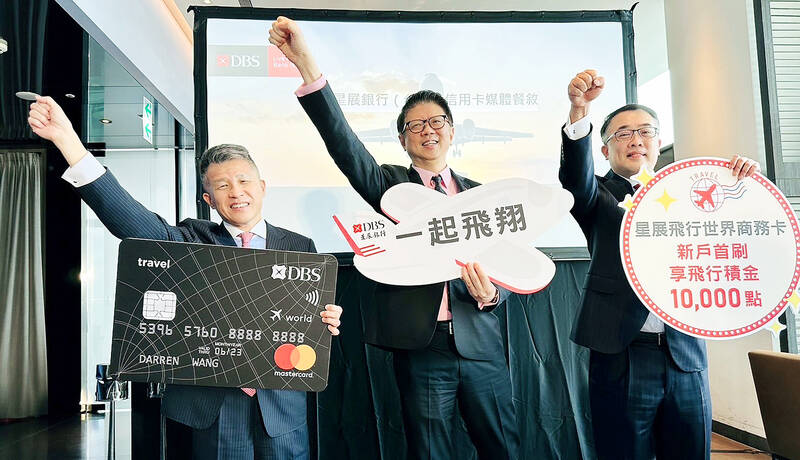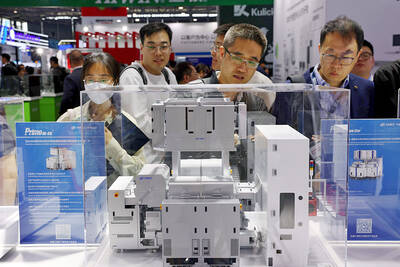As Taiwan relaxes its COVID-19 quarantine policy for inbound passengers and travel abroad becomes easier, DBS Bank Taiwan (星展台灣) has launched a series of credit card benefits to meet the needs of different cardholders.
The DBS Flying World Business Card offers a special flight mile accrual rate of 1 point per NT$15 spent overseas or NT$18 spent in Taiwan, making it the credit card of choice for consumers who want to collect miles quickly.
To celebrate the opening of borders, new cardholders who apply for the DBS Flying World Business Card can receive 10,000 bonus points when they make their first card payment. From now until Dec. 31 they can also enjoy an additional reward of one flight point for every NT$10 spent in Taiwan or overseas within 90 days of the card being issued, up to a maximum of 2,000 points per month.

Photo courtesy of DBS Bank Taiwan
Those who prefer cash rewards can apply for the DBS Eco Card, which offers a 2 percent cash reward for domestic purchases and a 3 percent reward for money spent overseas. Cardholders can also receive 1,000 cash reward points if they link their card with Apple Pay and use it to spend at least NT$1,000.
The DBS Eco Card is the first credit card in Asia to be made of biodegradable plastic.
DBS Taiwan general manager Lim Him-chuan (林鑫川) yesterday said that, despite the challenges posed by COVID-19 over the past three years, the bank has continued to invest in Taiwan, starting from the perspective of digital innovation and environmental sustainability to focus on providing products and services that meet customer needs.
DBS Taiwan cardholders’ average monthly overseas spending last quarter was three times higher than a year earlier and they made five times more overseas physical card transactions than last year, indicating strong travel-related demand, consumer banking managing director Seraph Sun (孫可基) said.
To cater to cardholders’ travel and accommodation needs, DBS Taiwan would provide a 5 percent additional rebate, as well as a discount of up to 35 percent for cardholders who pay online at booking sites such as Agoda, Expedia, Hotels.com and Booking.com from now until Dec. 31, the bank said.

SEMICONDUCTOR SERVICES: A company executive said that Taiwanese firms must think about how to participate in global supply chains and lift their competitiveness Taiwan Semiconductor Manufacturing Co (TSMC, 台積電) yesterday said it expects to launch its first multifunctional service center in Pingtung County in the middle of 2027, in a bid to foster a resilient high-tech facility construction ecosystem. TSMC broached the idea of creating a center two or three years ago when it started building new manufacturing capacity in the US and Japan, the company said. The center, dubbed an “ecosystem park,” would assist local manufacturing facility construction partners to upgrade their capabilities and secure more deals from other global chipmakers such as Intel Corp, Micron Technology Inc and Infineon Technologies AG, TSMC said. It

EXPORT GROWTH: The AI boom has shortened chip cycles to just one year, putting pressure on chipmakers to accelerate development and expand packaging capacity Developing a localized supply chain for advanced packaging equipment is critical for keeping pace with customers’ increasingly shrinking time-to-market cycles for new artificial intelligence (AI) chips, Taiwan Semiconductor Manufacturing Co (TSMC, 台積電) said yesterday. Spurred on by the AI revolution, customers are accelerating product upgrades to nearly every year, compared with the two to three-year development cadence in the past, TSMC vice president of advanced packaging technology and service Jun He (何軍) said at a 3D IC Global Summit organized by SEMI in Taipei. These shortened cycles put heavy pressure on chipmakers, as the entire process — from chip design to mass

Germany is to establish its first-ever national pavilion at Semicon Taiwan, which starts tomorrow in Taipei, as the country looks to raise its profile and deepen semiconductor ties with Taiwan as global chip demand accelerates. Martin Mayer, a semiconductor investment expert at Germany Trade & Invest (GTAI), Germany’s international economic promotion agency, said before leaving for Taiwan that the nation is a crucial partner in developing Germany’s semiconductor ecosystem. Germany’s debut at the international semiconductor exhibition in Taipei aims to “show presence” and signal its commitment to semiconductors, while building trust with Taiwanese companies, government and industry associations, he said. “The best outcome

Semiconductor equipment billings in Taiwan are expected to double this year, as manufacturers in the industry are keen to expand production to meet strong global demand for artificial intelligence applications, according to SEMI, which represents companies in the electronics manufacturing and design supply chain. Speaking at a news conference before the opening of Semicon Taiwan trade show tomorrow, SEMI director of industry research and statistics Clark Tseng (曾瑞榆) said semiconductor equipment billings in Taiwan are expected to grow by an annual 100 percent this year, beating an earlier estimate of 70 percent growth. He said that Taiwan received a boost from a